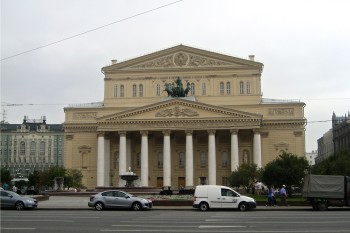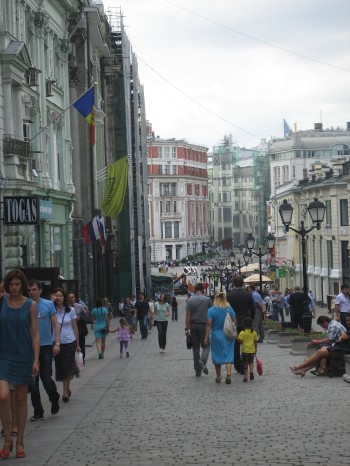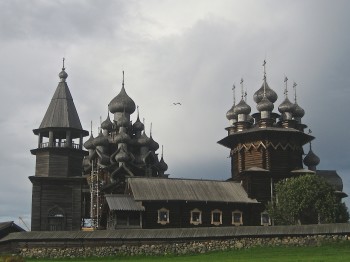In August 2013 I returned to Russia for the first time in five years to see how things were progressing.
St. Petersburg seemed much the same but Moscow looked even more affluent and elegant. The rebuilding of the old Hotel Moskva just off Red Square had been finished, as had the renovations to the Bolshoi Theatre – at last. The biggest visual difference, though, was that many of the streets in the central area, which used to be clogged with non-stop traffic, had been turned into beautiful pedestrian malls, complete with cobbles and well-maintained flower boxes. The grand old buildings from Tsarist times, now mostly restored, can therefore be seen in their original splendour, making for some very beautiful streetscapes.
There were some unexpected things in Moscow too: motorists actually stopped at pedestrian crossings! The thing that surprised me most, however, was that the area where the huge and monstrous Hotel Rossiya had stood, in a prime position overlooking Red Square, was still a fenced off no-man’s-land. Apparently various projects have been considered, but the current thinking is that it will be a large park.
Moscow’s re-built Cathedral of Christ the Saviour seems to have survived its notoriety over the pop girls’ group, Pussy Riot’s “unscheduled” performance there, which caused such a stir. The singing there by the choirs and priests at the main Sunday morning service was as spine-tinglingly ethereal as ever, as was a concert by the Zlatoust choir. This excellent ensemble now performs in the impressive Glazunov gallery, where you listen to soulful religious pieces and flirtatious folk songs surrounded by an extraordinary variety of works by the influential contemporary artist Ilya Glazunov. These range from very moving pencil sketches of Dostoyevsky scenes and characters to large, confronting religious and historic expressionistic works. It made for a fascinating juxtaposition of art and music, Russian style.
I re-visited some of my old favourites in the Tretyakov Gallery and Pushkin Museum but found it sad that still most tourist schedules only include the Hermitage, so visitors miss the great Russian artists. It was also disappointing, on a cruise along the Volga River specifically to see the Kizhi Monastery (an historic wooden complex centred on the stunning Church of the Transfiguration) that predominantly “European” (i.e. non-Russian) food was served and American popular music was played over the PA. When I commented on this I was told, “People like what they are familiar with”. But surely they were there to discover Russia!
“INSIDE STORIES”, 8 YEARS ON
Although we keep in touch, the main reason for my visit was to catch up with the Russian friends who had shared their experiences with me in 2005 for my “Inside Stories”, about the effects on them of the changes in the 1990s, and I was especially interested to find out whether their views about Mr Putin had changed.
Russia did not seem to suffer as much as many countries in the Global Financial Crisis, due largely to its huge energy resources, and most people I spoke to thought the economic situation was slowly improving. However, pensions are still low and there is a view that life is less secure for young people now because they do not know if they will get a job and are bombarded by advertisements for things they can’t afford.
A few of my friends’ circumstances have now changed, most notably Larissa’s. She has retired from the school but still has a number of private students to “prop up” her small pension, and is very proud of their good exam results. Physically, however, she is very slowed up, and is waiting for expensive hip surgery. Though Natalia continues to teach she is no longer associated with Maxim Shostakovich’s little school around the church dome, which has closed and moved to Tsarskoye Selo. Valeri is still a Professor of Philosophy at Yaroslavl but Elena has given up University teaching, for reasons I found worrying: she felt that the standard of her students and the course she was teaching had fallen so much, due partly to more people paying to get places, that she no longer agreed with the aims of her department. Sadly she was not the only one who commented on the decline of educational standards; I heard this from a number of people. If this is indeed is he case, I feel that Russia is losing one of its biggest assets. Elena is still, however, working as a guide, as are Julia, Inna and Gallina, whereas Lydia has retired from the museum.
The person whose life had changed the most was Julia’s daughter Svetlana, half of the “fiery duo”. She has a new partner since that very animated, and at times hostile discussion with Andrei in 2005 and she and her husband Dima have two lively little boys. They live about an hour from Moscow in a village of very comfortable looking new or restored cottages housing people who, like them, are escaping the turmoil of city life. Some just come at weekends but others, like them, live there permanently. Dima has to commute to the city for work but Svetlana, who is still a lawyer, works largely from home on-line. They have restored their dacha beautifully and it has many personal touches including some of Svetlana’s craftwork. Surrounding the cottage is a garden with flower beds and fruit trees, and a bath house which has become Dima’s tool shed and a play house for the boys. The closest city, which is only about 10 minutes away by car, has a number of different schools where the boys can go when they reach school age and a large range of goods and services. Life at present, though very hectic, seems settled and fulfilling for Svetlana.
And what is their current view of President Putin?
In 2005 I had quizzed my friends about Putin, at that stage just into his second term as President. At the time there was overwhelming support for him, and I wondered if that was still the case eight years on. He still had some very strong followers, Larissa telling me firmly, “I trust him, I respect him, I believe him, I feel he is my leader and I would vote for him. My daughter thinks the same and my relatives are all for him”. More commonly, however, I found support for him was more muted, but although people might not agree with all Putin does, they admire the way he speaks up for what he thinks is best for Russia, and does not cow-tow to the West. The view was also expressed that Putin is confronting corruption and that the mafia now has less power – though people seem to accept that corruption is a part of life – and politics!
Though there were misgivings about Putin most people I spoke to supported him, but some because there is no viable alternative, the opposition being weak, some even suspecting foreign influence.
One comment summed up the views of many people I spoke to, and ended with a typically droll comment:
“I would say that it looks like Putin is a man who is unable to step away from power and gradually he is becoming detached from reality. It is true that for a long time he enjoyed popularity in Russia, but now there is a significant reduction in his support. However, we should be grateful that his opponents are not in labour camps and are free to speak.”
The most common criticism of Putin was that he is asserting too much authority over local decisions and elections (sometimes to the point of over-ruling democratic votes). There is also a concern about the length of time he could be in power. On one thing, however, nearly everyone was in agreement: that the sentence on Pussy Riot had been for too severe, when, “They are just silly girls”. As for Svetlana, who had been very sceptical about democracy and all politicians in 2005 she said that her attitude had changed, and she now saw the importance of voting and of supporting the “new” system.
Unfortunately I was not able to get to Pskov to see Inna, but in addition to her current political “take”, I asked whether the recent tourist season had been a busy time for her. Her reply to this question was wonderfully cryptic, but she then got diverted into the most poetic description of Russia’s autumn:
“If you have a horseshoe and want it to bring good luck to you, nail it to your foot and work like a horse. This is the answer to the question of how I am and how work is. Summer is over. It has its charm, but autumn is my favorite. Autumn is a memory of summer. It is a time of change and hope. I love the warm sun on cool days, the crisp air, crunchy leaves and their stunning colors, wild mushroom pies and cider. What else? Dressing in layers, cozy sweaters, warm scarves. Fall is a perfect time to take a walk in a park and I am filled with the fall spirit and magic. Idyllic scenery: leaves (their colors are so vivid: burnt orange, flame red, plum purple, tan, mossy green), red and yellow berries, crystal raindrops. Yes, we have had a perfect example of fall weather. Rain in the morning, followed by patches of the blue sky, but, alas, the grey sky won over and we got another burst of rain, and so on until the sun pushed away the evil grey. I love fall contrasts with their amazing atmosphere of beauty, serenity, the comfort of solitude. There is no rush and everything is trivial compared to eternity. Well, I start philosophizing…
With such “magic” still in their veins, and the beauty of autumn taking precedence over politics, how could you not be optimistic about Russia and its people!


